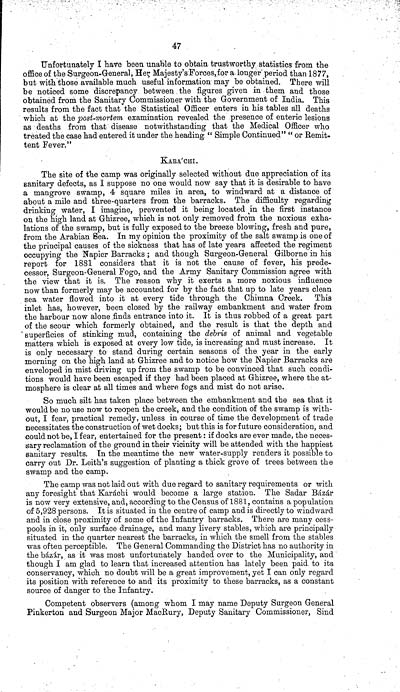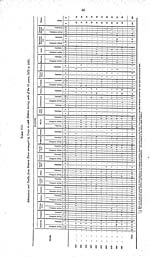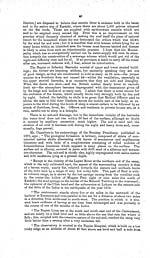Medicine - Disease > Report on enteric fever
(63) Page 47
Download files
Individual page:
Thumbnail gallery: Grid view | List view

47
Unfortunately I have been unable to obtain trustworthy statistics from the
office of the Surgeon-General, Her Majesty's Forces, for a longer period than 1877,
but with those available much useful information may be obtained. There will
be noticed some discrepancy between the figures given in them and those
obtained from the Sanitary Commissioner with the Government of India. This
results from the fact that the Statistical Officer enters in his tables all deaths
which at the post-mortem examination revealed the presence of enteric lesions
as deaths from that disease notwithstanding that the Medical Officer who
treated the case had entered it under the heading "Simple Continued" "or Remit-
tent Fever."
KARA'CHI.
The site of the camp was originally selected without due appreciation of its
sanitary defects, as I suppose no one would now say that it is desirable to have
a mangrove swamp, 4 square miles in area, to windward at a distance of
about a mile and three-quarters from the barracks. The difficulty regarding
drinking water, I imagine, prevented it being located in the first instance
on the high land at Ghizree, which is not only removed from the noxious exha-
lations of the swamp, but is fully exposed to the breeze blowing, fresh and pure,
from the Arabian Sea. In my opinion the proximity of the salt swamp is one of
the principal causes of the sickness that has of late years affected the regiment
occupying the Napier Barracks; and though Surgeon-General Gilborne in his
report for 1881 considers that it is not the cause of fever, his prede-
cessor, Surgeon-General Fogo, and the Army Sanitary Commission agree with
the view that it is. The reason why it exerts a more noxious influence
now than formerly may be accounted for by the fact that up to late years clean
sea water flowed into it at every tide through the Chimna Creek. This
inlet has, however, been closed by the railway embankment and water from
the harbour now alone finds entrance into it. It is thus robbed of a great part
of the scour which formerly obtained, and the result is that the depth and
superficies of stinking mud, containing the debris of animal and vegetable
matters which is exposed at every low tide, is increasing and must increase. It
is only necessary to stand during certain seasons of the year in the early
morning on the high land at Ghizree and to notice how the Napier Barracks are
enveloped in mist driving up from the swamp to be convinced that such condi-
tions would have been escaped if they had been placed at Ghizree, where the at-
mosphere is clear at all times and where fogs and mist do not arise.
So much silt has taken place between the embankment and the sea that it
would be no use now to reopen the creek, and the condition of the swamp is with-
out, I fear, practical remedy, unless in course of time the development of trade
necessitates the construction of wet docks; but this is for future consideration, and
could not be, I fear, entertained for the present: if docks are ever made, the neces-
sary reclamation of the ground in their vicinity will be attended with the happiest
sanitary results. In the meantime the new water-supply renders it possible to
carry out Dr. Leith's suggestion of planting a thick grove of trees between the
swamp and the camp.
The camp was not laid out with due regard to sanitary requirements or with
any foresight that Karchi would become a large station. The Sadar Bzr
is now very extensive, and, according to the Census of 1881, contains a population
of 5,928 persons. It is situated in the centre of camp and is directly to windward
and in close proximity of some of the Infantry barracks. There are many cess-
pools in it, only surface drainage, and many livery stables, which are principally
situated in the quarter nearest the barracks, in which the smell from the stables
was often perceptible. The General Commanding the District has no authority in
the bzr, as it was most unfortunately handed over to the Municipality, and
though I am glad to learn that increased attention has lately been paid to its
conservancy, which no doubt will be a great improvement, yet I can only regard
its position with reference to and its proximity to these barracks, as a constant
source of danger to the Infantry.
Competent observers (among whom I may name Deputy Surgeon General
Pinkerton and Surgeon Major MacRury, Deputy Sanitary Commissioner, Sind
Unfortunately I have been unable to obtain trustworthy statistics from the
office of the Surgeon-General, Her Majesty's Forces, for a longer period than 1877,
but with those available much useful information may be obtained. There will
be noticed some discrepancy between the figures given in them and those
obtained from the Sanitary Commissioner with the Government of India. This
results from the fact that the Statistical Officer enters in his tables all deaths
which at the post-mortem examination revealed the presence of enteric lesions
as deaths from that disease notwithstanding that the Medical Officer who
treated the case had entered it under the heading "Simple Continued" "or Remit-
tent Fever."
KARA'CHI.
The site of the camp was originally selected without due appreciation of its
sanitary defects, as I suppose no one would now say that it is desirable to have
a mangrove swamp, 4 square miles in area, to windward at a distance of
about a mile and three-quarters from the barracks. The difficulty regarding
drinking water, I imagine, prevented it being located in the first instance
on the high land at Ghizree, which is not only removed from the noxious exha-
lations of the swamp, but is fully exposed to the breeze blowing, fresh and pure,
from the Arabian Sea. In my opinion the proximity of the salt swamp is one of
the principal causes of the sickness that has of late years affected the regiment
occupying the Napier Barracks; and though Surgeon-General Gilborne in his
report for 1881 considers that it is not the cause of fever, his prede-
cessor, Surgeon-General Fogo, and the Army Sanitary Commission agree with
the view that it is. The reason why it exerts a more noxious influence
now than formerly may be accounted for by the fact that up to late years clean
sea water flowed into it at every tide through the Chimna Creek. This
inlet has, however, been closed by the railway embankment and water from
the harbour now alone finds entrance into it. It is thus robbed of a great part
of the scour which formerly obtained, and the result is that the depth and
superficies of stinking mud, containing the debris of animal and vegetable
matters which is exposed at every low tide, is increasing and must increase. It
is only necessary to stand during certain seasons of the year in the early
morning on the high land at Ghizree and to notice how the Napier Barracks are
enveloped in mist driving up from the swamp to be convinced that such condi-
tions would have been escaped if they had been placed at Ghizree, where the at-
mosphere is clear at all times and where fogs and mist do not arise.
So much silt has taken place between the embankment and the sea that it
would be no use now to reopen the creek, and the condition of the swamp is with-
out, I fear, practical remedy, unless in course of time the development of trade
necessitates the construction of wet docks; but this is for future consideration, and
could not be, I fear, entertained for the present: if docks are ever made, the neces-
sary reclamation of the ground in their vicinity will be attended with the happiest
sanitary results. In the meantime the new water-supply renders it possible to
carry out Dr. Leith's suggestion of planting a thick grove of trees between the
swamp and the camp.
The camp was not laid out with due regard to sanitary requirements or with
any foresight that Karchi would become a large station. The Sadar Bzr
is now very extensive, and, according to the Census of 1881, contains a population
of 5,928 persons. It is situated in the centre of camp and is directly to windward
and in close proximity of some of the Infantry barracks. There are many cess-
pools in it, only surface drainage, and many livery stables, which are principally
situated in the quarter nearest the barracks, in which the smell from the stables
was often perceptible. The General Commanding the District has no authority in
the bzr, as it was most unfortunately handed over to the Municipality, and
though I am glad to learn that increased attention has lately been paid to its
conservancy, which no doubt will be a great improvement, yet I can only regard
its position with reference to and its proximity to these barracks, as a constant
source of danger to the Infantry.
Competent observers (among whom I may name Deputy Surgeon General
Pinkerton and Surgeon Major MacRury, Deputy Sanitary Commissioner, Sind
Set display mode to: Large image | Zoom image | Transcription
Images and transcriptions on this page, including medium image downloads, may be used under the Creative Commons Attribution 4.0 International Licence unless otherwise stated. ![]()
| India Papers > Medicine - Disease > Report on enteric fever > (63) Page 47 |
|---|
| Permanent URL | https://digital.nls.uk/74577700 |
|---|
| Description | Dated 1883, report of typhoid fever at stations occupied by British troops in Bombay Presidency. |
|---|---|
| Shelfmark | IP/13/SB.6 |
| Additional NLS resources: | |




